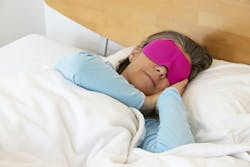Sleep apnea and low oxygen levels while sleeping are associated with epilepsy that first occurs after 60 years of age, known as late-onset epilepsy, according to a new study funded by the National Institutes of Health (NIH) and published in Sleep.
The link was independent of other known risk factors for late-onset epilepsy and sleep apnea including hypertension and stroke. The findings may help to better understand the relationship between sleep disorders and late-onset epilepsy, as well as identify potential targets for treatment.
Researchers, led by Christopher Carosella, M.D., assistant professor of neurology at Johns Hopkins University, Baltimore, identified cases of late-onset epilepsy using Medicare claims and analyzed sleep data from more than 1,300 participants in a study of sleep-disordered breathing and cardiovascular disease. They found that people whose oxygen saturation fell below 80% during sleep, a condition known as nocturnal hypoxia, were three times more likely to develop late-onset epilepsy compared to those who did not have similarly low oxygen levels. In addition, participants with self-reported sleep apnea in later life were twice as likely to develop late-onset epilepsy as those without the sleep disorder.
The degree of hypoxia during sleep was associated with late-onset epilepsy, independent of other co-occurring medical issues and demographic factors. The authors note that the study did not detect an association between the apnea-hypopnea index, a traditional measure of sleep apnea severity.
Sleep apnea is known to be a risk factor for poor brain health in other ways, including risk of stroke and dementia, but an association with epilepsy had not been described previously. The link to hypoxia suggests that repeated chronic exposure to low oxygen levels overnight might lead to brain changes that ultimately lead to risk of epilepsy. The study can’t determine whether treating or preventing sleep apnea might reduce the risk of epilepsy, but it does suggest that this may be an important potential target for reducing risk of late-onset epilepsy.

